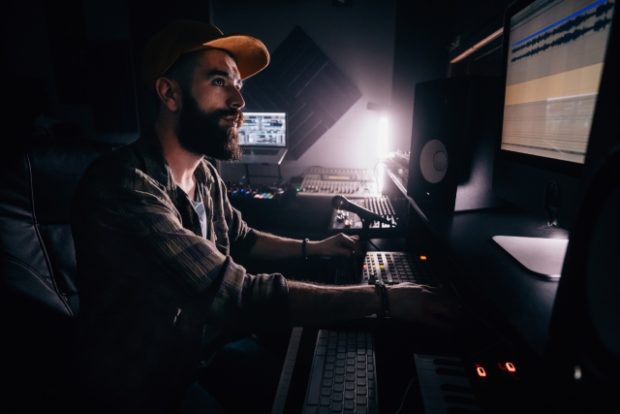How AI could help fight plagiarism in the music business

Spotify is reportedly working on an algorithm that could warn songwriters if their compositions copy elements of other songs, potentially exposing them to plagiarism lawsuits. Image: IStock/wundervisuals via AFP Relaxnews.
Katy Perry, Led Zeppelin, Ed Sheeran, Robin Thicke, Pharrell Williams. It can be hard to keep count of all the plagiarism lawsuits that have tarnished the music industry in recent years. To tackle the problem, giants of the sector are turning to artificial intelligence as a potential means of accurately determining when “inspiration” goes too far.
Spotify is currently working on an algorithm that could let musicians know whether their latest compositions copy parts of existing songs, reported the magazine, Music Business Worldwide. Patent applications were apparently filed at the end of November in the United States and in Europe for a new technology named “Plagiarism Risk Detector and Interface.”
The invention is said to analyze so-called “lead sheets,” a kind of musical score for songs denoting melody, chords and sometimes more, to detect whether they copy any elements of any other tracks featured on the Spotify platform. These could be harmonies, sequences of chords or fragments of melody, for example. After taking into account “a plurality of elements,” the algorithm would then tell the songwriter whether their composition is at risk of copyright infringement. It could also provide a link to the track resembling the creation analyzed by the AI in order to facilitate rewriting.
“Such a tool would allow artists to generate lead sheets more quickly and confidently by detecting and providing visual feedback as to whether any aspect of the work has a probability of being deemed plagiaristic,” read the Spotify patent, quoted in Music Business Worldwide.
Avoiding ‘musical landmines’
Although the Swedish streaming giant has not said when its “plagiarism detector” could see the light of day, other researchers are working on algorithms that could spare artists the pain of discovering that their latest tune might be a bit too heavily inspired by the work of a fellow musician.
This notion of accidental infringement was the basis of a plagiarism lawsuit concerning George Harrison’s song “My Sweet Lord,” the melody of which resembled “He’s So Fine” by The Chiffons. The case resulted in a New York court ordering the former Beatle to pay almost $16 million (approx. P769.4 million) to the Bright Tunes music publishing company, after judging that Harrison had “subconsciously” copied the Chiffons’ tune.
But, as the programmer, musician, and copyright attorney, Damien Riehl explained, “What neither George Harrison, nor the Chiffons, nor the judge, really, nor anybody else had considered, is maybe since the beginning of time, the number of melodies is remarkably finite.”
To tackle the problem, the lawyer joined forces with his colleague Noah Rubin to develop an algorithm to find every possible eight-note, 12-beat melody contained within an octave. That’s 68.7 billion pop-style melodies. Once recorded to a fixed, tangible medium like a hard drive, these combinations of notes are considered copyrighted. Theoretically, they therefore cannot be used without crediting Riehl and Rubin, or their copyright is infringed.
In an effort to protect artists who might unintentionally compose a tune resembling one of these 68.7 billion melodies, the two lawyers turned them over to the public domain, making the melodies available online via Internet Archive, and sharing the code that generated them. The pair also used a Creative Commons Zero license to release the melodies, which means they have no rights reserved over them.
“Nolan and I have made all the melodies and put them into the public domain in an effort to give songwriters more freedom… to be able to make more and more music and less fear of accidentally stepping on musical landmines,” said Riehl in his recent TedxTalk.
Although the legal ramifications of the pair’s initiative are still to be clarified, the venture is indicative of growing concern in the music business, since artists like Thicke and Williams have been ordered to pay six-figure sums in copyright infringement cases.
“If we lose our freedom to be inspired we’re going to look up one day and the entertainment industry as we know it will be frozen in litigation,” Williams told the Financial Times at the time of the ruling. Perhaps AI could offer at least some of the solutions to help the business avoid this worst-case scenario. CC
RELATED STORIES:
How AI can help budding poets sort out their stanza
Harnessing artificial intelligence as a firefighting tool of the future